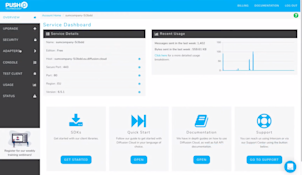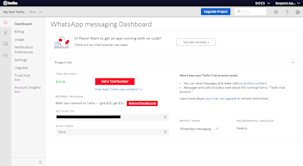Push Technology vs Twilio
This Push Technology vs Twilio comparison was created based on reviews from developers and our best attempts to perform analysis by looking at documentation and other publicly available resources.
Easily build complete, trusted realtime functionality.
Take our APIs for a spin Push Technology |  Twilio | |
|---|---|---|
| Getting started and developer experience | ||
Time to "hello world" Reviewed by 3+ independent developers Ratings were given based on the average amount of time it takes to sign up to a new account and publish the first message. | 4 / 5 5 = <30 min | 4 / 5 5 = <30 min |
Demos / Tutorials A selection of online demos and tutorials so you can test and see the code in action. Explore Ably's tutorials for our pub/sub messaging platform | ||
Documentation Reviewed by 3+ independent developers Explore Ably's documentation for our pub/sub messaging platform | 3.50 / 5 Getting started guides / 5 Information architecture and developer journey / 5 API reference documentation / 5 Readability, design and navigation / 5 Quality of code / 5 Breadth and quality of tutorials / 5 “Push Technology documentation for its Diffusion product consists of several components. First, we have a quick start guide, which is pretty decent. It’s structured to provide step-by-step guidance on how to set up Diffusion and use the APIs and the SDKs. The screen is split so that you can look at documentation and code snippets in parallel - a nice touch. Then, there’s an online manual, which is significantly more detailed, with code snippets throughout. Unfortunately, there aren’t any details in the guide about the quality of service or how to architect for scalability. There’s a detailed API reference for each SDK and comprehensive release notes. The design could be improved, as it’s a bit dry, and so could the navigation experience - some links return 404, and the various sections of the documentation aren’t cross-linked. There are just a few demos available, with no source code and only several tutorials.“ | 4.83 / 5 Getting started guides / 5 Information architecture and developer journey / 5 API reference documentation / 5 Readability, design and navigation / 5 Quality of code / 5 Breadth and quality of tutorials / 5 The documentation is quite comprehensive and well detailed, with easy access to code samples while you read through it. There are quickstart tutorials for all the products using different SDKs. However, I feel some developers may get lost while trying to find references or while trying to navigate the various pages, especially around the API reference. |
Dashboard or dev console Reviewed by 3+ independent developers Sign up for free and explore Ably's pub/sub messaging platform | 4.67 / 5 Ease of use / 5 Stats and reports / 5 Functionality / 5  “The Service Dashboard is feature-rich, and it allows you to easily create, manage, and remove resources, configure settings, and view detailed stats, such as the number of messages, the CPU load, or the topic count. There’s also a nice section in the Dashboard that allows you to test your pipeline. The user experience is mostly intuitive, and the functionality is explained well (there are many tooltips throughout). However, the UI design could perhaps benefit from a refresh, as it’s a bit outdated.“ | 4.33 / 5 Ease of use / 5 Stats and reports / 5 Functionality / 5  The dev console allows you to manage and configure all things Twilio. This includes SMS, Chat, Notify, Sync, Voice, Video, etc. The stats and reports gives its users a general overview of what goes on with their account. This includes API accessed, cost, exact time of access. Besides the general overview, I like the fact that every product has its page where users can view a better breakdown of the activities. I also like that activities are being viewed in monthly ranges. This means you get a detailed report for activities in a month. This way, the report isn’t clumsy or cumbersome. |
SDKs Note: Only official SDKs were taken into account. Explore Ably's 25+ SDKs for our pub/sub messaging platform | 7 SDKs Including:
| 6 SDKs Including:
|
API structure Reviewed by 3+ independent developers | 3.25 / 5 API consistency across SDKs / 5 Well structured / 5 Intuitive / 5 Simple / 5 “Diffusion APIs are consistent across SDKs in the sense that operations are performed in the same order. However, the APIs are quite complex - there are tens of classes and methods, with some different naming conventions across some of the SDKs, such as JavaScript, Java, or C, which is counter-intuitive. The API references are structured and presented differently, which is not great; at least they are detailed and thorough. There are examples for all SDKs on GitHub, which is useful.” | 5 / 5 API consistency across SDKs / 5 Well structured / 5 Intuitive / 5 Simple / 5 The Twilio API is well structured, intuitive, and consistent across all SDKs. The methods are also easy to understand. The documentation provides different pages for each programming language and platforms, making it easy to set up on the backend server for production use with different platforms. |
 Push Technology |  Twilio |
|---|---|
| "Hello world" code example | |
| |
 Push Technology |  Twilio | |
|---|---|---|
| Realtime features | ||
Pub/Sub messaging Pub/Sub is a design pattern that lets any number of publishers (producers) push messages to channels (also known as topics). Multiple subscribers (consumers) can subscribe to a channel to consume published messages. Explore Ably's pub/sub messaging implementation | ||
Message queues A message queue is a form of asynchronous service-to-service communication. Messages are stored on a queue until they are processed. Note that each message is only consumed by one subscriber (consumer). Explore Ably's message queues implementation | ||
Presence Presence enables you to track the online and offline status of devices and end-users in real time and to store their state. Essential for chat apps and multiplayer games. Explore Ably's presence implementation | ||
Message history Message history provides a means to retrieve previously published messages. For this to be possible, message data must be stored (persisted) somewhere. Explore Ably's message history implementation | Limited The maximum message retention duration is 13 months. In October 2020, this was one of three key changes Twilio made in the way it stores message records: 1. Message log history will only be available from the last 13 months via Twilio Console and the Messages API Resource. Messages logs older than 13 months will still be accessible via the Bulk Export API, or the Bulk Export Message Log Archives in Console. 2. All Media Objects (e.g. MMS and WhatsApp message file attachments - pictures, audio, etc.) from Messages older than 13 months will be permanently deleted. 3. Deleting a Message log will also automatically remove any Media objects associated with that message. This applies to all Twilio products. | |
Connection state recovery (stream resume) In the case of unreliable network conditions, clients may suddenly disconnect.Connection state recovery ensures that when they reconnect, the data stream resumes exactly where it left off. Explore Ably' s connection state recovery implementation | Limited Push Technology operates a recovery buffer of sent messages but if a message has been lost or is no longer in the recovery buffer the server will abort the reconnection. | |
Guaranteed message ordering Ordering ensures that messages are delivered to consumers in the same order that producers publish them. Explore Ably' s guaranteed message ordering implementation | ||
Exactly-once semantics Exactly-once is a system-wide data integrity guarantee that ensures each message is delivered to consumers exactly-once. Explore Ably' s idempotent publishing implementation | ||
Message delta compression Message delta compression enables you to only send the changes from the previous message to subscribers each time there’s an update, instead of the entire message. Useful for use cases where there is a significant degree of similarity between successive messages. Explore Ably' s message delta compression implementation | ||
Native push notifications Native push notifications can be used to deliver messages even when clients are offline. Useful for geolocation updates or news alerts. Explore Ably's push notifications implementation | ||
Webhooks Webhooks provide a mechanism to get messages and other types of events (such as clients entering or leaving channels) pushed to your servers over HTTP. Explore Ably's webhooks implementation | ||
Serverless functions A serverless function is essentially an isolated, single-purpose piece of code that is only executed when it’ triggered by an event. For example, you can use serverless functions to send a welcome message to clients when they become present on chat channels. Note that serverless functions are usually fully managed by cloud vendors. Explore Ably's serverless functions implementation | ||
Built-in integrations Which popular services & systems are Push Technology and Twilio integrated with? Explore Ably's library of integrations | Webhooks
Serverless functions
Streaming
| Webhooks
Serverless functions
Streaming
|
Known limits and constraints Find out practical limits, such as the maximum message size, or the maximum number of concurrent connections. Explore the practical limits of the Ably pub/sub messaging platform | Publisher throughput Unknown Maximum message size Unknown Maximum number of topics Unlimited (only applies to Enterprise customers). Maximum number of connections Unknown | Publisher throughput Unknown Maximum message size Unknown Maximum number of topics Unknown Maximum number of connections Unknown |
| Supported development platforms, languages, open protocols and cloud models | ||
|---|---|---|
Development platforms & operating systems Which popular development platforms and operating systems do Push Technology and Twilio support via official SDKs? Explore the development platforms supported by Ably |
|
|
Languages Which popular programming languages do Push Technology and Twilio support via offical SDKs? Explore the programming languages supported by Ably |
|
|
Open protocols Which popular open protocols do Push Technology and Twilio support? Explore the open protocols supported by Ably |
|
|
Cloud models Which popular cloud models do Push Technology and Twilio support? |
|
|
| Global and reliable edge service | ||
|---|---|---|
Edge messaging network with latency-based routing Latency-based routing ensures that clients are always routed to the nearest datacenter and point of presence. Explore Ably's routing mechanism that mitigates network and DNS issues | ||
Multi-region data replication (message durability) Multi-region data replication (storage) protects against single points of failure and ensures message data durability. Learn how Ably ensures message durability | Limited Only available for Enterprise customers. | |
Uptime SLAs Here’s what the most common SLAs amount to in terms of downtime over a calendar year: 99.999% SLA = 5m 15s downtime per year 99.99% SLA = 52m 35s downtime per year 99.95% SLA = 4h 22m 58s downtime per year 99.9% SLA = 8h 45m 56s downtime per year 99% SLA = 3d 15h 39m 29s downtime per year Source: https://uptime.is/ | 99.9% | 99.95% uptime 99.99% uptime for Twilio Services 99.99% uptime for SendGrid Services |
Quality of Service What QoS guarantees do Push Technology and Twilio provide natively? Explore Ably's availability and uptime guarantees for our pub/sub messaging platform |
|
|
| Security | ||
|---|---|---|
API key authentication The simplest way to authenticate. Involves using private API keys that you can usually create and edit via a dashboard. Recommended to be used server-side, as private API keys shouldn’t be shared with untrusted parties. Explore Ably's implementation of API key authentication | ||
Token-based authentication Which popular token-based authentication mechanisms do Push Technology and Twilio support? Note that token-based authentication is usually the recommended strategy on the client-side as it provides more fine-grained access control and limits the risk of credentials being compromised. Explore Ably's implementation of token-based authentication |
|
|
Configurable rules and permissions Which types of configurable rules and permissions do Push Technology and Twilio support? Explore Ably's configurable rules and permissions |
|
|
Message encryption Which types of message encryption do Push Technology and Twilio support? Explore Ably's message encryption mechanisms |
|
|
Formal certifications Which formal certifications are Push Technology and Twilio compliant with? Explore Ably's security and compliance for our pub/sub messaging platform |
|
|
| Pricing & Support | ||
|---|---|---|
Free package What do the free packages offered by Push Technology and Twilio consist of? Explore Ably's free package for our pub/sub messaging platform | The free package includes 3 million monthly messages, 100 peak connections, unlimited topics, access to all major features and adapters, and basic support. | Not bad On Twilio Sync, your first 200 endpoint-hours for each month are free: “Endpoints are unique devices or browser tabs and are counted once for each wall-clock hour during which they interact with Sync. Each unique endpoint will incur charges of at most $0.01 per calendar day.” Users also get free access to their first 10,000 actions each month: “Actions are defined as incoming requests from your application that read and write data. Resulting webhooks, updates to connected endpoints, and storage are included in the cost of an action.” |
Pricing model How are the Push Technology and Twilio pricing models calculated? Explore Ably's pricing model for our pub/sub messaging platform | The basic pricing for the Business package starts at $49 per month. In addition, there are charges for the number of messages - $ 0.99 per million messages and for the number of connections - $ 0.01 per connection. It’s unclear how pricing is calculated for the Enterprise package. | Pricing varies on what service you intend to use. Specifically for Twilio Sync, the pay-as-you-go model is employed and pricing depends on the endpoint-hour. Here is the breakdown: Accessing 201 and 12,000 endpoint-hours costs $0.00250/endpoint-hour Once the 12,000 endpoint-hours threshold is crossed, users begin to pay a lesser amount. Between 12,001 and 72,000 users pay $0.00200/endpoint-hour |
Enterprise package What benefits do the Push Technology and Twilio enterprise packages offer? Explore Ably's enterprise package for our pub/sub messaging platform | The Enterprise package benefits include enterprise scale and performance, cross-region replication, configurable cluster size, bespoke performance tuning, bespoke packages for all sizes. | Twilio offers a Premium Support package. Key benefits
|
Community Reviewed by 3+ independent developers Explore Ably's community support channel for our pub/sub messaging platform | 1 / 5 Presence on multiple channels / 5 Size and activity / 5 “Push Technology has a community forum, but there’s a very small number of posts and an even smaller number of followers (a maximum of 11 followers per forum category). Similarly, there are maybe 20 threads on Stack Overflow, and basically no community activity on GitHub. No presence on Gitter or Discourse. It’s essentially a non-existent community.” | 4.50 / 5 Presence on multiple channels / 5 Size and activity / 5 Twilio has moderate online presence. I could not find an online presence on Slack, but I was able to find Twilio-related engagements on Discourse and Stackoverflow. There are other recognized channels like Twilio Developer Community, and Twilio on Dev.to, where Twilio organizes hackathons and where you can find tutorials. The community there is active and generates content like new projects, articles, and answers to questions. You are likely to get or find an answer to your question, regardless of how complex it is. Twilio repositories have over one thousand stars on GitHub. |
Support What types of support options and response times do Push Technology and Twilio offer? Explore Ably's support options for our pub/sub messaging platform | General support options Email, web support, documentation, developer hub, phone (only for Platinum package), screenshare (Gold and Platinum packages). Enterprise support The Platinum package is the equivalent of enterprise support. It includes early access to beta features and a dedicated account manager. Response time 2 hours for Platinum package 3 hour minimum for Live Events package 24 hours for Gold package Best effort response times for the Basic package | Twilio's support options include: * Help Center * 24/7 phone and email support (for premium customers). Typically it takes about 1-3 hours to get support. |
Disclaimer: The information presented for Push Technology was last updated on 15 December 2020 and on 16 May 2025 for Twilio. It is possible that some details may now be out of date. If you think that’s the case, please let us know so we can update them. In any case, you should not rely solely on the information presented here and must check with each provider before deciding to integrate or buy any of these two solutions.
View more comparisons
More to explore
About Ably
Ably is an enterprise-ready pub/sub messaging platform. We make it easy to efficiently design, quickly ship, and seamlessly scale critical realtime functionality delivered directly to end-users. Everyday we deliver billions of realtime messages to millions of users for thousands of companies.
Compare packages
Documentation
Rapidly build production-ready realtime capabilities with quickstart guides, realtime concepts, and full API reference.
Read the docs
Compare our tech
View more comparisons between Ably and other realtime messaging solutions and see why we are clearly the better choice.
View all comparisons




